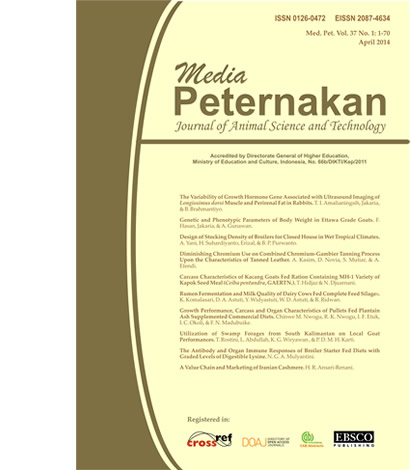Rumen Fermentation and Milk Quality of Dairy Cows Fed Complete Feed Silages
DOI:
https://doi.org/10.5398/medpet.2014.37.1.38Abstract
This study was conducted to evaluate the rumen fermentation and milk quality of Friesian Holstein (FH) cows given complete feed silages during lactation. Twelve FH cows in 5th mo lactation were offered four dietary treatments in a completely randomized design with three replications. The treatments were, control diet (NS) containing 50% concentrate, 45% elephant grass and 5% sun flower meal; grass complete feed silage (GS) containing 50% concentrate, 45% elephant grass and 5% sunflower meal; rice straw complete feed silage (RSS) containing 50% concentrate, 30% elephant grass, 15% rice straw and 5% sunflower and palm oil frond complete feed silage (PKS) containing 50% concentrate, 30% elephant grass, 15% palm oil frond, and 5% sunflower meal. Ensilage was done with addition of Lactobacillus plantarum 1A-2 and cellulase enzyme. Analysis of variance and Duncan test were applied to compare the different among the means of treatments. Complete feed silages had range of pH between 3.89-4.44, temperature of 28.0-29.67 oC and lactic acid bacteria of 0.54-1.50 x 108 cfu/g. Crude protein intake of RSS was the highest among treatments. Acetate concentration in rumen liquor was more than 70%. Milk yield and protein were not different among treatments. GS gave the highest milk fat (5.66%). The conclusion was that both complete feed silages, using rice straw or palm oil frond can be used as alternative rations for lactating dairy cows.
Key words: complete feed, silage, Friesian Holstein, palm oil frond, rice straw



